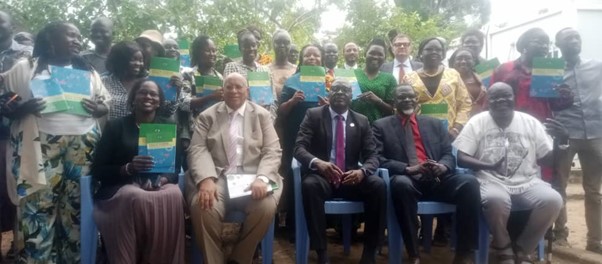South Sudan's English Daily Newspaper
"We Dare where others fear"

By Simon Deng
Women have called on the government to guarantee gender equality in the permanent constitution, submitting their demands to ensure the rights and interests of women and girls are formally recognised and protected.
On Thursday, a Women’s Charter was submitted to the National Constitution Review Commission, outlining key demands, priorities, and concerns.
This submission seeks to ensure that the rights and interests of women and girls are fully considered for potential inclusion in the permanent constitution.
The Women’s Charter is an advocacy document developed to position women’s priorities and concerns within the constitution-making process.
The submission of the Charter aligns with Section 12 (6) of the Constitution Making Process Act, 2022, which empowers the Reconstituted National Constitutional Commission (R-NCRC) to receive, analyse, and consider inputs and submissions from public participation and consultations.
Joyce Ayoub, the programme assistant for the national Ministry of Gender, Child and Social Welfare, stated that the charter submitted to the National Constitution Review Commission calls for a gender-responsive and inclusive permanent constitution.
“Through this charter, we present our collective demands and call for legal, policy, and programmatic reforms across key areas, including political participation, education, marriage, health, economic rights, and access to justice,” said Ayoub.
“The charter calls for the permanent constitution to raise the affirmative action from 35% to 50% gender representation across all organs and decision-making structures,” she added.
Korto Williams, the acting country representative for UN Women, expressed readiness to support women in embodying the principle of gender equality at both national and subnational levels.
“The participation of women in political and public life is particularly important. The rights of women and girls are enshrined in the revitalised peace agreement, as well as under international and regional instruments,” said Williams.
Francis James Kutiyote, the Undersecretary of the Ministry of Parliamentary Affairs, affirmed his ministry’s commitment to championing the promotion of gender equality and improving access to opportunities in political and public life.
“This charter is a testament to the dedication of the Ministry of Gender, Child and Social Welfare to ensure inclusivity, participation, and transparency based on applicable international norms. The Ministry of Parliamentary Affairs supports efforts to promote a gender-responsive constitution,” said Kutiyote.
Riang Yier Zuor, the chairperson of the National Constitution Review Commission, emphasised that constitution-making should champion the promotion of gender equality and freedom from all forms of discrimination.
“The charter has been developed to articulate the set of priorities and demands of women and girls. The constitution-making process provides an important entry point to address some of the critical issues of concern to the women and girls of South Sudan,” said Zuor.
The Ministry of Gender, Child and Social Welfare (MGCSW), with the support of the United Nations Entity for Gender Equality and the Empowerment of Women (UN Women) in South Sudan, is organising a public submission of the South Sudan Women’s Charter to the National Constitutional Review Commission (NCRC).



